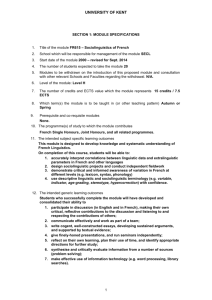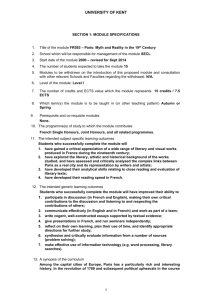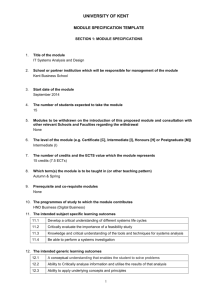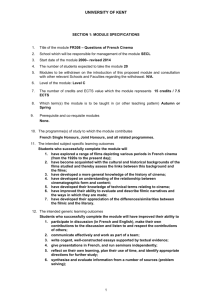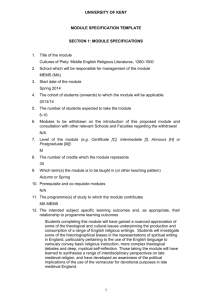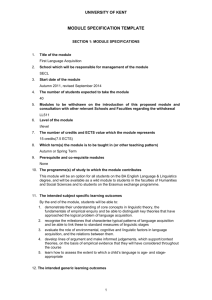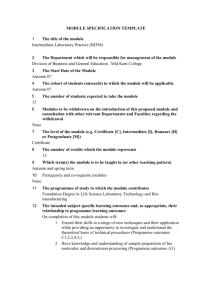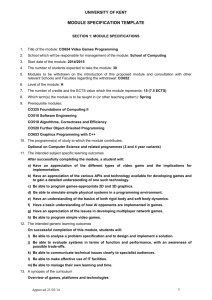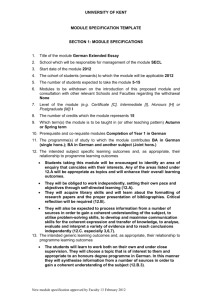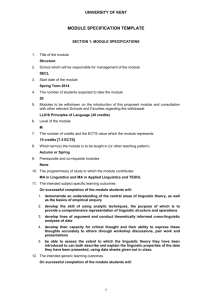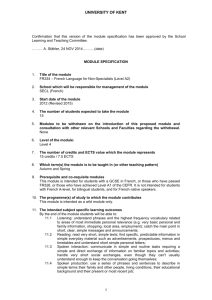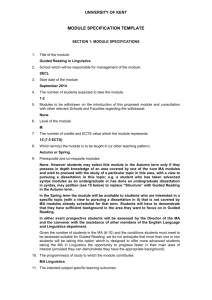FR599 - University of Kent
advertisement
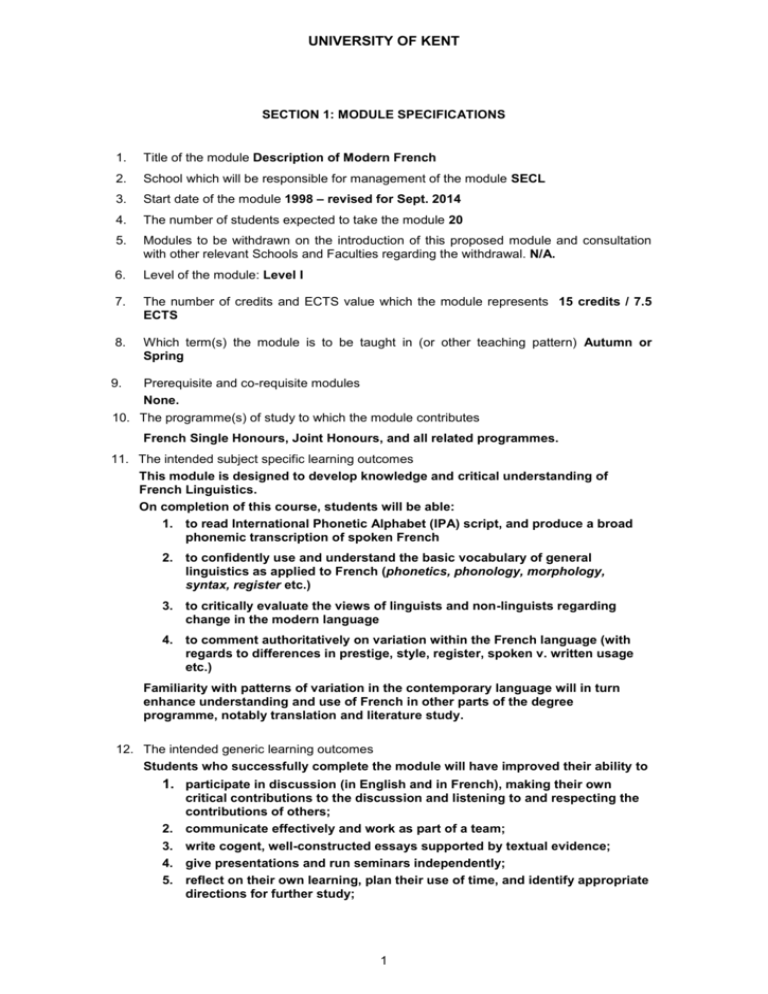
UNIVERSITY OF KENT SECTION 1: MODULE SPECIFICATIONS 1. Title of the module Description of Modern French 2. School which will be responsible for management of the module SECL 3. Start date of the module 1998 – revised for Sept. 2014 4. The number of students expected to take the module 20 5. Modules to be withdrawn on the introduction of this proposed module and consultation with other relevant Schools and Faculties regarding the withdrawal. N/A. 6. Level of the module: Level I 7. The number of credits and ECTS value which the module represents 15 credits / 7.5 ECTS 8. Which term(s) the module is to be taught in (or other teaching pattern) Autumn or Spring 9. Prerequisite and co-requisite modules None. 10. The programme(s) of study to which the module contributes French Single Honours, Joint Honours, and all related programmes. 11. The intended subject specific learning outcomes This module is designed to develop knowledge and critical understanding of French Linguistics. On completion of this course, students will be able: 1. to read International Phonetic Alphabet (IPA) script, and produce a broad phonemic transcription of spoken French 2. to confidently use and understand the basic vocabulary of general linguistics as applied to French (phonetics, phonology, morphology, syntax, register etc.) 3. to critically evaluate the views of linguists and non-linguists regarding change in the modern language 4. to comment authoritatively on variation within the French language (with regards to differences in prestige, style, register, spoken v. written usage etc.) Familiarity with patterns of variation in the contemporary language will in turn enhance understanding and use of French in other parts of the degree programme, notably translation and literature study. 12. The intended generic learning outcomes Students who successfully complete the module will have improved their ability to 1. participate in discussion (in English and in French), making their own 2. 3. 4. 5. critical contributions to the discussion and listening to and respecting the contributions of others; communicate effectively and work as part of a team; write cogent, well-constructed essays supported by textual evidence; give presentations and run seminars independently; reflect on their own learning, plan their use of time, and identify appropriate directions for further study; 1 UNIVERSITY OF KENT 6. synthesise and critically evaluate information from a number of sources (problem solving); 7. make effective use of information technology (e.g. word processing, library searches). 13. A synopsis of the curriculum Written and spoken French are now, arguably, so far apart as to constitute distinct varieties. Unlike most French modules, this module will take the latter as its starting point. The phonology (sound system) will first be explored, and basic transcription skills acquired, with consideration of recent and ongoing changes in the general system known as français standard. The module will then move on to consider the gap between written and spoken French grammar, notably in such areas as the tense/mood system, morphosyntax or pronouns, grammatical gender and agreement, and verb classification. The treatment of neologisms, and particularly the status of franglais in contemporary French, will also be considered. Although the module will provide students with some basic tools of linguistic description, no background in Linguistics is required or assumed. 14. Indicative Reading List Battye, A; Hintze, M-A. and Rowlett, P. (2000) The French Language Today. London: Routledge. Fagyal, Z; Kibbee, D, and Jenkins, F. (2006) French: A Linguistic Introduction. Cambridge: Cambridge University Press. Lodge, R.A.; Armstrong, N., Ellis, Y. & Shelton, J. (1997) Exploring the French Language. London: Edward Arnold. Price, G. (2005) An Introduction to French Pronunciation. Oxford: Blackwell. Tranel, B. (1987) The Sounds of French. Cambridge University Press. Walter, H. (1988) Le Français dans tous les sens. Paris: Laffont. (or French Inside Out. (1994) London: Routledge) 15. Learning and Teaching Methods, including the nature and number of contact hours and the total study hours which will be expected of students, and how these relate to achievement of the intended learning outcomes One weekly two-hour seminar for 10 weeks, for which discussion topics are set in advance. Total Contact hours: 20 Total Study Hours: 150 Student commitments to this module will be approximately ten hours per week, two contact hours in the classroom and eight hours of study and preparation (generic learning outcomes 3, 5, 6, 7). After the first week, students will be divided into presentation groups of 2-3 and expected to give at least one presentation on a topic listed in the module programme. Each group will also be required to lead questioning on at least one other presentation. It is essential that the ‘questioning’ group read the short item assigned to them, which is designed to facilitate wider discussion after the presentation has been completed. Additional material may also be provided via Moodle. (Subject-specific learning outcomes 1-4; generic learning outcomes 1, 2, 4, 6). 16. Assessment methods and how these relate to testing achievement of the intended learning outcomes The final mark for the module will be based on the following elements: If the module runs in the Autumn term: 2 UNIVERSITY OF KENT Linguistic Commentary (500 words): 20% Essay (in English or in French – 2400 words): 60% Oral presentation: 20% If the module runs in the Spring term: Essay (in English or in French – 2000 words): 40% Oral presentation: 20% Examination (summer term): 40% If the module runs in the Autumn term, the Linguistic Commentary will be a short summary based on topics explored in the first half of the module, and requiring students to demonstrate understanding of key linguistic themes underpinning the module as a whole. One-to-one feedback will be provided, which will inform the Essay, to be submitted later in the term. If the module runs in the Spring term, feedback on the essay will be provided well in advance of the exam. The mark for the seminar presentation will be awarded for a group presentation during the term. In the event of a group or individual being asked to perform more than one presentation, the higher of the two marks awarded will count. A bonus mark may be added to the seminar presentation mark of individual students whose contribution throughout the term (e.g. in leading questioning after presentations) is exceptional. Written work tests achievements of subject-specific learning outcomes 1-4 and generic learning outcomes 3, 5, 6, 7. Oral work tests achievement of subjectspecific learning outcomes 1-4 and generic learning outcomes 1, 2, 4, 6. If the module runs in the Autumn term, the module will be 100% coursework. If the module runs in the Spring term, the examination will take place in the Summer term. 17. Implications for learning resources, including staff, library, IT and space None. 18. The School recognises and has embedded the expectations of current disability equality legislation, and supports students with a declared disability or special educational need in its teaching. Within this module we will make reasonable adjustments wherever necessary, including additional or substitute materials, teaching modes or assessment methods for students who have declared and discussed their learning support needs. Arrangements for students with declared disabilities will be made on an individual basis, in consultation with the University’s disability/dyslexia support service, and specialist support will be provided where needed. 19. Campus(es) where module will be delivered: Canterbury 3 UNIVERSITY OF KENT SECTION 2: MODULE IS PART OF A PROGRAMME OF STUDY IN A UNIVERSITY SCHOOL Statement by the School Director of Learning and Teaching/School Director of Graduate Studies (as appropriate): "I confirm I have been consulted on the above module proposal and have given advice on the correct procedures and required content of module proposals" ................................................................ .............................................. Director of Learning and Teaching/Director of Graduate Studies (delete as applicable) Date ………………………………………………… Print Name Statement by the Head of School: "I confirm that the School has approved the introduction of the module and, where the module is proposed by School staff, will be responsible for its resourcing" ................................................................. .............................................. Head of School Date ……………………………………………………. Print Name SECTION 3: MODULE IS PART OF A PROGRAMME IN A PARTNER COLLEGE OR VALIDATED INSTITUTION (Where the module is proposed by a Partner College/Validated Institution) Statement by the Nominated Officer of the College/Validated Institution (delete as applicable): "I confirm that the College/Validated Institution (delete as applicable) has approved the introduction of the module and will be responsible for its resourcing" ................................................................. Nominated Responsible Officer College/Validated Institution of .............................................. Partner …………………………………………………. Print Name ………………………………………………….. Post …………………………………………. Partner College/Validated Institution Module Specification Template Last updated January 2013 4 Date
